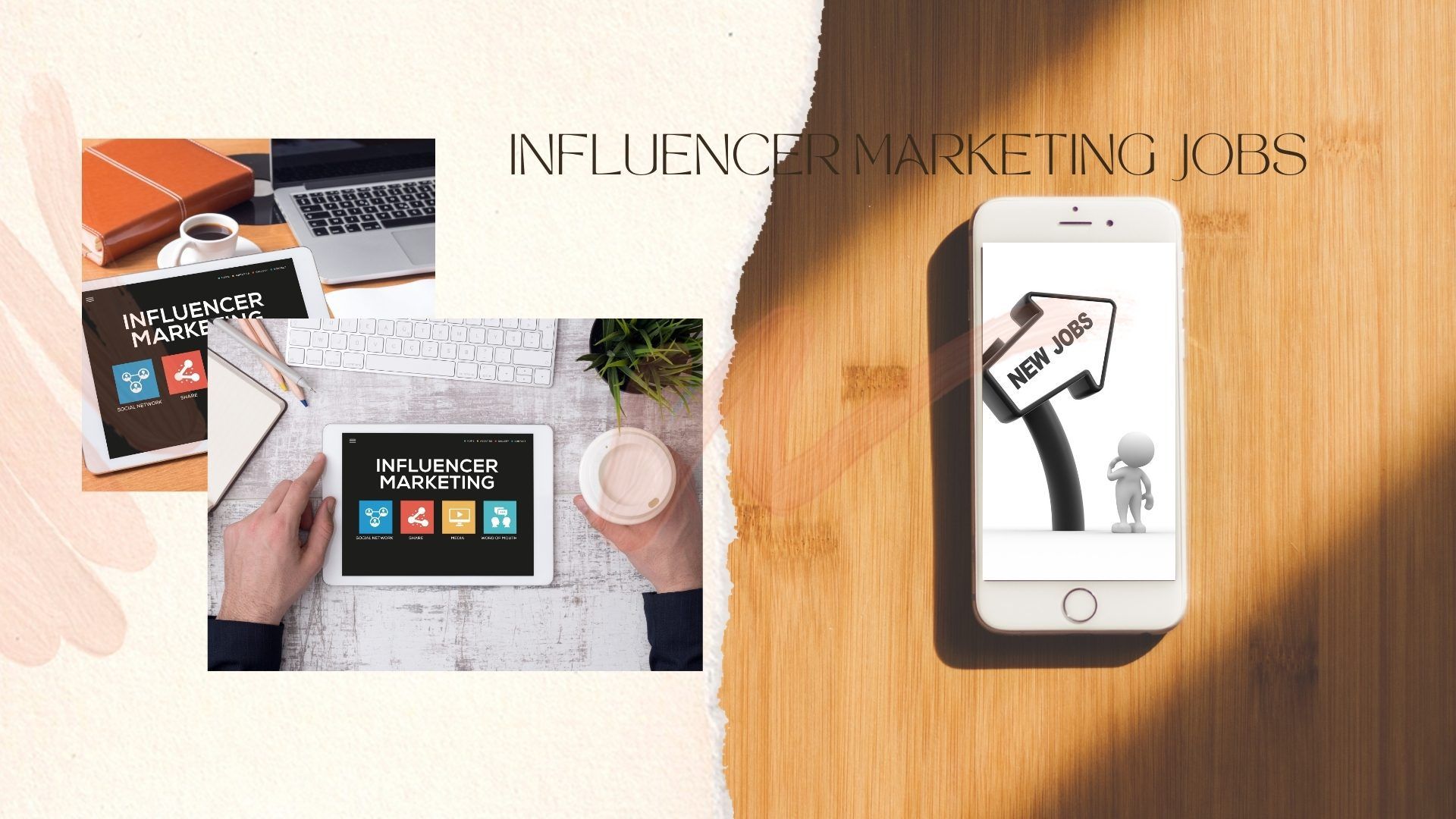Introduction & Types of Influencer Marketing Jobs
Introduction
What is Influencer Marketing?
Influencer Marketing Jobs is a dynamic and ever-evolving field that leverages individuals with a solid online presence to promote products and services. Its strategy has taken the digital marketing world by storm, transforming how brands connect with their audiences. But what exactly is Influencer Marketing? At its core, it’s about leveraging the reach and influence of social media personalities to drive brand awareness, engagement, and, ultimately, sales.
The concept of Influencer Marketing isn’t entirely new. Celebrities have endorsed products for decades, lending their fame to boost brand credibility. However, the rise of Social Media platforms like Instagram, YouTube, and TikTok has democratized this concept, allowing everyday individuals to become influential figures in their niches. These influencers, with their authentic connections to their followers, have become powerful marketing tools for brands.
Evolution of Influencer Marketing
The journey of Influencer Marketing from traditional celebrity endorsements to social media influencers has been remarkable. In the early days, brands relied heavily on celebrities to reach their target audiences. These endorsements were often costly and lacked the personal touch that influencers provide.
With the advent of social media, a shift occurred. Everyday individuals, armed with a passion for their interests and a knack for content creation, began to amass large followings. These new-age influencers offered authenticity and relatability that traditional celebrities could not. They shared their lives, opinions, and experiences in a way that resonated with their audiences personally.
As social media platforms evolved, so did Influencer Marketing. Brands started to recognize the value of partnering with influencers who had built trust and loyalty among their followers. Influencer marketing strategies became more sophisticated, utilizing data and analytics to identify the right influencers and measure campaign success. Today, influencer marketing is a multi-billion dollar industry, integral to the marketing strategies of countless brands worldwide.
Importance of Influencer Marketing Jobs
The rise of Influencer Marketing Jobs has created a plethora of job opportunities. There is a growing demand for skilled professionals, from managing influencer relationships to developing marketing strategies and analyzing campaign performance. Influencer marketing jobs are not just about working with influencers; they encompass a range of roles that require diverse skill sets.
The economic impact of Influencer Marketing is significant. According to recent reports, the influencer marketing industry is expected to grow to $15 billion by 2024. This growth increases job opportunities for those looking to enter the field. Whether you are a creative content creator, a data-driven analyst, or a strategic thinker, there is a place for you in the world of Influencer Marketing.
Types of Influencer Marketing Jobs
In-House Influencer Marketing Roles
In-house influencer marketing roles involve working directly within a company or brand. These positions are typically part of the marketing or communications departments and focus on developing and executing influencer marketing strategies.
- Responsibilities:
– Identifying and partnering with suitable influencers.
– Coordinating and managing influencer campaigns.
– Analyzing campaign performance and generating reports.
- Pros:
– Job security and benefits.
– Access to company resources and tools.
– Opportunities for career growth within the organization.
- Cons:
– Less flexibility compared to freelancing or remote work.
– Potentially limited creative freedom.
Freelance Influencer Marketing Jobs
Freelance influencer marketing jobs offer flexibility and independence. Freelancers work on a project-by-project basis, providing their services to various clients.
- Flexibility and Independence: Freelancing allows individuals to set their schedules and choose the projects they want to work on. This freedom can lead to a better work-life balance and opportunities to pursue personal interests alongside professional work.
- Securing Freelance Gigs: Building a solid portfolio and network is essential to succeed as a freelance influencer marketer. Platforms like Upwork, Fiverr, and LinkedIn can be valuable for finding freelance opportunities. Networking with industry professionals and maintaining a presence on social media can also help attract clients.


Remote Influencer Marketing Jobs
Remote influencer marketing jobs have become increasingly popular, especially after the COVID-19 pandemic. These positions allow professionals to work from anywhere, providing greater flexibility and convenience.
- Benefits of Remote Work:
– Flexibility: Remote work offers the freedom to create a personalized work schedule and environment.
– Work-Life Balance: Employees often have more time for personal activities without commuting.
– Cost Savings: Reduced expenses for commuting, meals, and work attire.
- Tools and Platforms:
Practical remote work relies on various tools and platforms for communication, collaboration, and project management. Slack, Trello, Asana, and Zoom are commonly used to facilitate remote work.
Skills Required & The Role for Influencer Marketing Jobs
Skills Required for Influencer Marketing Jobs
Creative Skills
Creativity is at the heart of influencer marketing. Successful influencer campaigns rely on engaging and innovative content that resonates with audiences.
- Importance of Creativity:
Creative skills enable marketers to craft compelling stories and visuals that capture attention. Creativity is vital in differentiating brands in a crowded marketplace, from developing unique campaign concepts to creating eye-catching graphics and videos.
- Examples of Creative Campaigns:
– Interactive Content: Utilizing interactive elements like polls, quizzes, and challenges to engage audiences.
– User-Generated Content: Encouraging followers to create and share content related to the brand.
– Storytelling: Crafting narratives that emotionally connect with audiences and convey brand values.
Analytical Skills
Analytical skills are crucial for measuring the effectiveness of influencer marketing campaigns and making data-driven decisions.
- Role of Data Analysis:
Data analysis helps marketers understand audience behavior, campaign performance, and ROI. By analyzing metrics such as engagement rates, reach, and conversions, marketers can optimize their strategies for better results.
- Tools for Measuring Success:
Various tools and platforms, such as Google Analytics, Hootsuite, and Sprout Social, provide insights into campaign performance. These tools help track key metrics and generate reports that guide strategic decisions.
Communication Skills
Effective communication is essential for building and maintaining relationships with influencers and stakeholders.
- Strategies for Effective Communication:
– Clear and Concise Messaging: Conveying information clearly and efficiently.
– Active Listening: Understanding the needs and concerns of influencers and stakeholders.
– Negotiation Skills Navigating agreements and contracts with influencers and brands.
- Building Relationships:
Strong relationships with influencers are built on trust and mutual respect. Regular communication, transparency, and collaboration are vital to maintaining positive relationships and successful campaigns.
The Role of AI in Influencer Marketing
AI Influencer Tools
Artificial intelligence (AI) transforms influencer marketing by providing advanced tools that enhance efficiency and effectiveness.
- Overview of AI Tools:
AI tools streamline various aspects of influencer marketing, from identifying influencers to optimizing campaigns. Tools like Traackr, Influencity, and AspireIQ use AI algorithms to analyze vast amounts of data and provide actionable insights.
- Enhancing Campaign Efficiency:
AI tools can automate time-consuming tasks like influencer discovery, content analysis, and performance tracking. This automation allows marketers to focus on strategic decision-making and creative work.
Benefits of AI in Influencer Marketing
AI offers several benefits that can significantly improve influencer marketing efforts.
- Improved Targeting and Personalization:
AI algorithms can analyze audience data to identify the most relevant influencers and tailor campaigns to specific demographics. This precision ensures marketing messages reach the right people, increasing engagement and conversion rates.
- Cost and Time Savings:
By automating routine tasks, AI reduces the time and effort required for campaign management. This efficiency leads to cost savings and allows marketers to allocate resources to more strategic activities.
Challenges with AI Influencers
Despite its benefits, AI in influencer marketing also presents challenges that must be addressed.
- Ethical Concerns and Authenticity:
AI-generated or virtual influencers raise ethical questions about authenticity and transparency. Consumers may be concerned about these influencers’ genuine nature and the potential for deceptive practices.
- Technical Limitations and Consumer Trust:
AI technology is still evolving, and technical limitations can impact the effectiveness of AI tools. Additionally, gaining consumer trust in AI-driven campaigns requires careful consideration of ethical and transparent practices.
Freelance Influencer Marketing Jobs & Tools
Freelance Influencer Marketing Jobs
Platforms for Finding Freelance Jobs
Several platforms connect freelance influencer marketers with potential clients and projects.
- Popular Platforms:
– Upwork: A global freelancing platform that offers various influencer marketing projects.
– Fiverr: A marketplace for freelancers to offer their services to clients worldwide.
– LinkedIn: A professional networking site that can help freelancers find job opportunities and connect with industry professionals.
- Creating an Effective Profile:
A strong profile is essential for attracting clients. Highlight your skills, experience, and successful campaigns. Use testimonials and case studies to showcase your expertise and build credibility.
Pros and Cons of Freelancing
Freelancing offers unique advantages and challenges that influence career decisions.
- Benefits:
– Flexibility: Freelancers can set their schedules and choose their projects.
– Independence: Freelancers can work independently and make their own decisions.
– Variety: Freelancers can work on diverse projects with different clients, gaining varied experiences.
- Challenges:
– Income Stability: Freelancers may face fluctuating incomes and periods without work.
– Self-Management: Freelancers must manage their time, finances, and client relationships.
– Limited Benefits: Freelancers typically do not receive health insurance or paid leave benefits.
Success Stories
Successful freelance influencer marketers can serve as inspiration and provide valuable insights.
- Case Studies:
– Example 1: A freelance influencer marketer who built a thriving business specializing in a niche market.
– Example 2: A freelancer who leveraged social media to attract high-profile clients and grow their career.
- Lessons Learned:
– Networking: Building a solid network of industry contacts is crucial for finding opportunities.
– Adaptability: Being adaptable and willing to learn new skills can help freelancers stay competitive.
– Persistence: Persistence and determination are vital to overcoming challenges and achieving success.


Influencer Marketing Tools
Essential Tools for Influencers
Influencers use various tools to create, manage, and optimize content and campaigns.
- Tools for Content Creation and Scheduling:
– Canva: A graphic design tool for creating visually appealing content.
– Hootsuite: A social media management platform for scheduling and managing posts.
– Adobe Creative Suite: A collection of design and editing tools for professional content creation.
- Influencer Marketing Platforms and Networks:
Platforms like Influencity, AspireIQ, and Traackr connect influencers with brands and provide tools for managing campaigns, tracking performance, and analyzing data.
Analytics and Reporting Tools
Data analytics is crucial for measuring the success of influencer marketing campaigns and making informed decisions.
- Importance of Data Analytics:
Analytics tools help track key metrics such as engagement rates, reach, and conversions. They provide insights into audience behavior and campaign performance, enabling marketers to optimize their strategies.
- Top Analytics Tools:
– Google Analytics: A comprehensive tool for tracking website traffic and user behavior.
– Sprout Social: A social media management and analytics platform.
– BuzzSumo: A tool for analyzing content performance and identifying trends.
Collaboration Platforms
Collaboration platforms facilitate effective communication and project management, ensuring that influencer marketing campaigns run smoothly.
- Tools for Managing Collaborations:
Platforms like Trello, Asana, and Monday.com provide task assignments, progress tracking, and team collaboration features. These tools help streamline workflows and ensure that everyone stays on track.
- Benefits of Using Collaboration Platforms:
– Improved Communication: Clear and open communication channels.
– Enhanced Productivity: Efficient task management and progress tracking.
– Seamless Collaboration: Easy file sharing and collaboration on projects.
Building a Successful Career in Influencer Marketing & Challenges
Building a Successful Career in Influencer Marketing
Starting in Influencer Marketing
Entering the influencer marketing industry requires skills, experience, and strategic planning.
- Steps to Break Into the Industry:
– Education and Training: Pursue relevant courses and certifications in marketing and social media.
– Building a Portfolio: Create a portfolio showcasing your work, including successful campaigns and content.
– Networking: Connect with industry professionals through social media, events, and online communities.
- Building a Personal Brand and Portfolio:
Establish a personal brand that reflects your expertise and unique perspective. Use social media platforms and a professional website to showcase your work and attract potential clients or employers.
Networking and Building Relationships
Networking is crucial for career growth in influencer marketing. Building solid relationships with industry professionals can lead to job opportunities and collaborations.
- Importance of Networking:
Networking helps you stay updated with industry trends, gain insights from experienced professionals, and find job opportunities. Attend industry events, join online communities, and engage with peers on social media.
- Tips for Building and Maintaining Relationships:
– Be Genuine: Show genuine interest in others and offer help when possible.
– Stay Connected: Regularly communicate with your network through social media, email, or phone calls.
– Provide Value: Share valuable insights, resources, or opportunities with your network.
Continuous Learning and Development
The influencer marketing industry constantly evolves, making continuous learning essential for career success.
- Staying Updated with Industry Trends:
To stay informed about the latest trends and developments, read industry blogs, attend webinars, and participate in online courses. Follow thought leaders and influencers to stay informed about new strategies and tools.
- Resources for Professional Development:
– Online Courses: Platforms like Coursera, Udemy, and LinkedIn Learning offer courses on influencer marketing and related topics.
– Industry Conferences: Attend conferences and events to learn from experts and network with peers.
– Certifications: Obtain certifications in social media marketing, data analytics, and other relevant areas.
Challenges in Influencer Marketing Jobs
Managing Multiple Campaigns
Influencer marketers often juggle multiple campaigns simultaneously, which can be challenging.
- Strategies for Effective Campaign Management:
– Organization: Use project management tools to keep track of tasks and deadlines.
– Prioritization: Prioritize tasks based on importance and deadlines.
– Delegation: Delegate tasks to team members to manage workload effectively.
- Tools for Streamlining Campaign Processes:
Platforms like Asana, Trello, and Monday.com can help manage multiple campaigns by providing features for task assignment, progress tracking, and collaboration.
Measuring ROI
Measuring influencer marketing campaigns’ return on investment (ROI) is crucial for assessing their success and justifying marketing spend.
- Importance of ROI Measurement:
ROI measurement helps determine the effectiveness of campaigns and guides future marketing strategies. It provides insights into what works and doesn’t, allowing marketers to optimize their efforts.
- Techniques for Accurate ROI Calculation:
– Set Clear Goals: Define specific, measurable goals for each campaign.
– Track Key Metrics: Monitor engagement rates, reach, conversions, and other relevant metrics.
– Use Analytics Tools: Leverage tools like Google Analytics, Sprout Social, and BuzzSumo to track and analyze campaign performance.
Staying Relevant in a Fast-Paced Industry
The influencer marketing industry is dynamic, requiring professionals to stay updated and adapt.
- Adapting to Industry Changes:
Stay informed about new trends, tools, and strategies by following industry news, attending events, and participating in online communities. Be open to experimenting with new approaches and learning from successes and failures.
- Strategies for Continuous Growth and Relevance:
– Continuous Learning: Invest in ongoing education and professional development.
– Networking: Build and maintain relationships with industry professionals.
– Innovation: Embrace new technologies and creative ideas to stay ahead of the competition.
Impact of Social Media Algorithms on Influencer Marketing
Understanding Social Media Algorithms
Social media algorithms are the secret sauce behind what users see on their feeds. These algorithms determine which posts get prime real estate and which get buried. Understanding how they work is crucial for anyone involved in influencer marketing.
- How Algorithms Affect Influencer Marketing:
Social media algorithms prioritize content based on engagement rates, relevance, and user behavior. For influencers, their content must be engaging but also timely and relevant to their audience. Algorithms are designed to keep users on the platform longer by showing them content they will likely interact with. Thus, an influencer’s success can hinge oinfluencer’sity to produce content that resonates with their followers.
- Fundamental Algorithm Changes and Their Impact:
Social media platforms frequently update their algorithms, impacting how content is distributed and seen. For example:
– Facebook and Instagram: These platforms have shifted to prioritize content from friends and family over brands. This means influencers must create more engaging and personal content to maintain visibility.
– YouTube: The platform has changed its recommendation algorithms to favor authoritative content, which affects influencers who rely on trending and viral content.
– TikTok: Known for its robust content discovery algorithm, TikTok continuously adjusts how it promotes content to ensure users see more of what they like.
Strategies to Beat the Algorithm
Given the significant role of algorithms, marketers need strategies to ensure their content reaches the right audience.
- Tips for Optimizing Content for Algorithms:
To succeed in the algorithm-driven world of social media, influencers should:
– Engagement: Focus on creating content that encourages likes, comments, and shares. Interactive content, such as polls and questions, can boost engagement.
– Relevance: Ensure content is relevant to current trends and audience interests. Using trending hashtags and topics can increase visibility.
– Consistency: Posting regularly helps maintain audience interest and engagement, which is crucial for staying in the algorithm’s good graces.
- Case Studies of Salgorithm’strategies:
Several influencers and brands have navigated algorithm changes successfully:
– Engagement-Driven Success: An influencer who used interactive Instagram Stories (polls, Q&As) to boost engagement and improve their content’s visibility.
– Trend Utilization: A brand content trending TikTok challenges to increase its reach and follower count.
Case Studies of Algorithm Changes
Examining past algorithm changes can offer insights into how to adapt future strategies.
- Examples of Significant Algorithm Changes:
– Facebook’s Family and Friends Update: When Facebook shifted itFacebook’s content from friends and family, influencers who adapted by sharing more personal stories and behind-the-scenes content saw better engagement.
– YouTube’s Authoritative Content Shift: Influencers who began producing YouTube’s in-depth, educational content in response to YouTube’s focus on authoritative sources noticed improved recommendations.
. Lessons Learned from Algorithm Updates:
- Key takeaways include:
– Adaptability: Being flexible and ready to change content strategies based on algorithm updates is essential.
– Quality over Quantity: Focusing on producing high-quality, engaging content rather than simply increasing the volume of posts.


How to Choose the Right Influencer Marketing Job
Identifying Your Strengths
Choosing the right job starts with understanding your strengths and their alignment with the role’s demands.
- Self-Assessment and Skill Identification:
Conduct a thorough self-assessment to identify your strengths, weaknesses, interests, and skills. Consider taking personality tests and career assessments to gain insights into suitable job roles.
- Matching Skills to Job Roles:
– Creative Skills: Roles in content creation, video production, and graphic design.
– Analytical Skills: Roles in data analysis, performance measurement, and strategy development.
– Communication Skills: Roles in PR, brand partnerships, and influencer relations.
Evaluating Job Offers
Not all job offers are created equal. It’s Crucial to evaluate them carefully to make an informed decision.
- Factors to Consider When Evaluating Job Offers:
– Company Reputation: Research the company, values, and culture.
– Job Responsibilities: Ensure the responsibilities align with your skills and career goals.
– Growth Opportunities: Look for opportunities for professional development and career advancement.
– Compensation and Benefits: Evaluate the salary, benefits, and work-life balance.
- Tips for Making the Right Decision:
– Research Thoroughly: Gather as much information as possible about the company and role.
– Ask Questions: Don’t hesitate to ask the employer about aspects of the job that are unclear or important to you.
– Trust Your Instincts: Consider how you feel about the role and company. Trust your instincts and choose the offer that feels right.
Long-Term Career Goals
Setting and working towards long-term career goals is crucial for sustained success and fulfillment in influencer marketing.
- Setting and Achieving Long-Term Career Goals:
Define Your Goals: Define your long-term career goals, whether they involve becoming a top influencer, leading a marketing team, or starting your agency.
– Create a Plan: Develop a step-by-step plan to achieve your goals, including necessary skills, experiences, and milestones.
– Stay Flexible: Be open to adjusting your goals and plans based on new opportunities and changes in the industry.
- Planning for Career Advancement:
– Continuous Learning: Invest in continuous learning through courses, certifications, and industry events.
– Networking: Build a solid professional network to gain insights, opportunities, and mentorship.
– Performance Tracking: Regularly track your performance and progress towards your goals, making adjustments as needed.
Conclusion
This guide has covered the various aspects of influencer marketing jobs, including understanding the landscape, different roles, and utilizing AI tools, trends, and best practices for success. We also explored the impact of social media algorithms, legal and ethical considerations, and the future of influencer marketing.
The influencer marketing industry is expected to continue growing and evolving. With the emergence of AI, virtual influencers, and new platforms, the landscape will become even more dynamic and exciting. Adaptable professionals who continuously learn and embrace new technologies will find abundant opportunities for success.
Influencer marketing offers an engaging and fulfilling career path for individuals passionate about creativity, technology, and connecting with audiences. As the industry evolves, staying informed and adaptable will be essential for thriving in this dynamic field. Whether just starting or aiming to advance your career, remember to focus on your strengths, stay curious, and always strive for authenticity and ethical practices.
FAQs
- What skills are essential for a successful career in influencer marketing?
To succeed in influencer marketing, you need strong communication skills, creativity, analytical abilities, and a good understanding of social media platforms. Content creation, video production, and data analysis skills are precious.
- How can I start a career in influencer marketing without prior experience?
Start by building a solid personal brand on social media, creating high-quality content, and engaging with your audience. You can also take online courses, attend industry events, and network with professionals to gain insights and opportunities.
- What are the key ethical considerations in influencer marketing?
Ethical considerations include transparency in disclosing partnerships, honesty in product endorsements, and respecting intellectual property rights. Promoting responsible and authentic marketing practices is essential to maintaining trust with your audience.
- How do social media algorithms impact influencer marketing?
Social media algorithms determine the visibility of content based on factors like engagement rates and relevance. Influencers must create engaging and relevant content to stay visible in users’ feeds and adapt to algorithm changes to maintain their reach.
- What is the future of influencer marketing jobs?
Advancements in AI, the rise of virtual influencers, and new social media platforms will shape the future of influencer marketing jobs. There will be increasing opportunities for personalization, e-commerce integration, and roles combining creative and analytical skills.










3 Responses
Fiverr is the world’s leading freelance marketplace,
trusted by top companies like Google, Meta, and Netflix. With over 700 freelance services available, it’s
the go-to platform for businesses and entrepreneurs who need affordable, professional freelancers.
From website development, SEO, logo design, video editing, content writing, and social media marketing
to advanced AI development and consulting, Fiverr gives
you access to experts ready to deliver quality results fast.
Unlike traditional hiring, Fiverr makes it easy
to hire freelancers online with flexible payment options, transparent reviews, and a satisfaction guarantee—you only pay when you’re happy.
Whether you’re a startup looking to grow or a business needing
specialized support, Fiverr helps you save time, reduce costs, and get projects done with confidence.
Start your project today and discover how Fiverr freelancers can help your business succeed: Join Fiverr Here :
https://go.fiverr.com/visit/?bta=1141320&brand=fiverraffiliates
Highest Forex Bonuses are a powerful way for traders to maximize their earnings from everyday trading. With EarnForexRebates.com you gain access to a reliable rebate system that rewards you on every trade. Unlike uncertain bonus schemes, our service is simple and transparent. The system works thanks to our direct cooperation with top-tier Forex companies, which allows us to offer you stable cashback rates. Every trade you make can generate a rebate, whether you win or lose. EarnForexRebates.com works with your existing broker accounts, meaning that you continue trading exactly as you do now, while we add cashback to your results. Clients can check our detailed cashback schedule to see exactly how much they will receive for every lot traded. This level of clarity makes it easy for traders to plan their costs. By joining EarnForexRebates.com, traders not only get cash back instantly, but also gain access to professional support. The rebate system is perfect for experienced traders, because it requires no extra effort. Many users report that their overall profits have improved, simply by claiming cashback. With automatic crediting, your rebate arrives without delay. If you are looking for a safe tool to increase returns, EarnForexRebates.com is the right choice that combines ease of use with real rewards. Sign up today and start earning extra from every trade.
https://earnforexrebates.com/
You need to tak part in a contest for one of the best websites on the internet.
I will recommend this blog! http://Boyarka-inform.com/